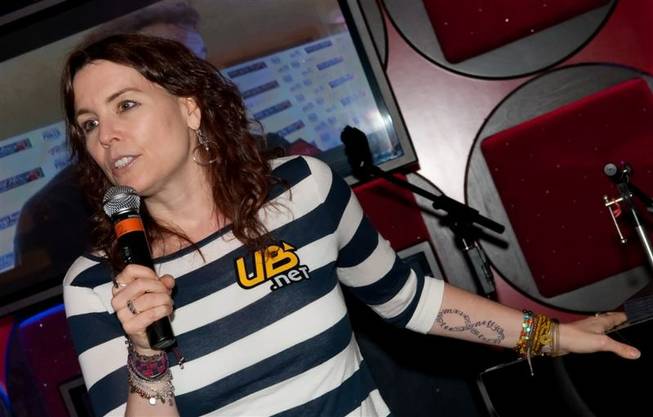
Tom Donoghue/www.donoghuephotography.com
Annie Duke at Extra Lounge in Planet Hollywood on July 1, 2010.
Tuesday, Nov. 9, 2010 | 2:10 p.m.
After her second place finish last year on Donald Trump’s reality show “Celebrity Apprentice,” Annie Duke cemented her crossover status in pop culture from the more crowded field of mere poker fame.
She’s still a curiosity in her own world, however.
Duke, who participated in a panel discussion Friday hosted by the Saltman Center for Conflict Resolution at UNLV’s William S. Boyd School of Law, said only 3 percent of poker players were women in 1994, when she began playing poker full-time. That percentage hasn’t changed, she said.
During her formative years playing poker, Duke said she played against men who typically fell into one of a few categories.
There were men who wanted to bed her and were therefore easy on her at the poker table. There were others who constantly called her bets rather than folding because they couldn’t bear losing a hand to a woman. And then there were the men who refused to take her seriously and therefore underestimated her abilities.
At the poker table, men called her “hot” – or “frigid” – a term used by a player upset after a loss.
While other female poker players were known to react angrily to chauvinist antics, Duke played it cool, knowing that composed detachment would mostly win out over the emotional reactions, and thus, poor decision-making, of her opponents.
Duke’s personal experience underscored one of the primary themes of the UNLV panel, titled “How to Play Your Hand: Lessons from Poker for Negotiators.”
The panel, which also featured Duke’s brother, poker pro Howard Lederer, and casino operator and poker icon Jack Binion, discussed how negotiators in the business world can maintain the upper hand in the same way that skilled poker players read their opponents and prepare for play.
Duke double majored in English and psychology at Columbia University and studied cognitive psychology at the University of Pennsylvania before leaving academia for poker.
She intended to become a teacher, like her parents. In a sense, she has become a cultural anthropologist of poker.
With millions in tournament winnings, Duke is one of the world’s top poker players. Instead of entering women’s-only tournaments, she competes alongside men and has been welcomed into their inner circle.
But she has also maintained her powers of detached observation and the ability to carefully dissect one of her favorite subjects: the testosterone-fueled male poker player.
Many will dispute that poker is a game primarily driven by skill rather than the luck of the draw. Witness Monday’s World Series of Poker Main Event winner – an unknown from Canada and one of many tournament winners who rarely repeat such star turns.
Yet few would dispute Duke’s dominance as both player and academic, nor that of her brother, who has earned the nickname “The Professor” for his equally thoughtful analysis of the game.
Other pros can talk about how an overexcited opponent bungled a hand. Duke will go one further, describing how the prefrontal cortex of the brain so critical to executive decision-making can’t function properly when the brain’s limbic system – a region that governs emotion, pleasure and fear – is in overdrive.
If that kind of overthinking isn’t enough, Duke also hosts a weekly Internet show where she recently discussed, among other things, genetically-modified food and the midterm elections. On her website, she dispenses poker strategy alongside parenting and nutrition tips.
It is her image as an intellectual and her desire to share her life’s knowledge with the masses that distinguishes her in a way that is uncharacteristic of the escapist fantasy world perpetuated by gambling and the gamblers who inhabit it.

Join the Discussion:
Check this out for a full explanation of our conversion to the LiveFyre commenting system and instructions on how to sign up for an account.
Full comments policy